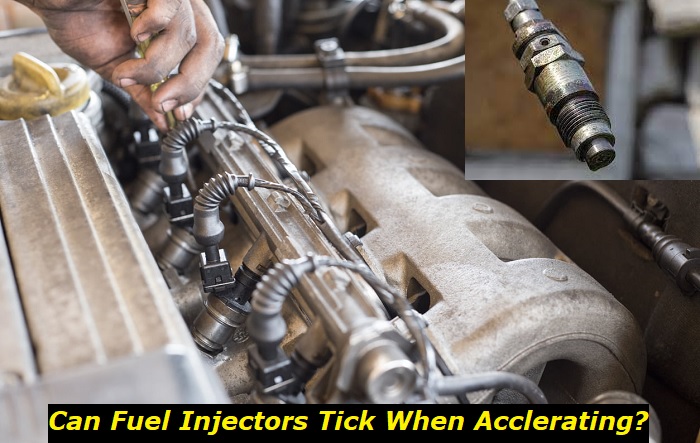You can't hear fuel injector noise when driving, usually, this noise means something else like a misfiring engine ticking or some other engine problems that need to be addressed. Such cases should be investigated, ticking noise when you accelerate your car are not normal and have to be dealt with.
Injection problems highlights
- Level of importance:High
- Can you drive?Usually, yes
- DIY inspection:Possible but complicated
- DIY repairs:Mostly,impossible
- Price of repair:$350 - $850
- Commonreasons:Clogging, age, electrical problems
- How to fix:Verify electrical connectors, clean the injectors, swap them to see if the codes change

Ticking noise from fuel injectors
Actually, your fuel injectors can make ticking noises. But they are pretty quiet and you will not be able to hear them when you try to accelerate your vehicle. Other noises and soundproof materials in modern cars will make it totally impossible to hear fuel injectors ticking when they are working at the edge of their opportunities.
If you are sure that one of the injectors is ticking, you should use the OBD2 scanner and check how injectors do in different conditions. For example, is there a special injector code when the vehicle is idling or when it is accelerating quickly?
But, in most cases, you shouldn't concentrate on injectors if you hear engine ticking noises when you accelerate the vehicle. While it may seem that the fuel injectors are ticking, it may actually be some other part. And this is what I'm going to talk about today.
What can tick in your car when you accelerate it?
This is one of the problems that is very difficult to diagnose. That's why many drivers have the legend that fuel injectors are ticking. Also, many DIYers change fuel injectors and get rid of annoying ticking noise. They actually solve the problem by replacing the faulty injector. But it wasn't the injector that was ticking. This was some other part of the engine.
So, if it's not the injector getting on your nerves when you accelerate in your vehicle, what can it be? Let's look at this list of possible culprits:
- detonation in the engine - unburnt gases because of engine misfiring can gather in one place and then explode;
- valve ticking - this usually happens in high-mileage engines that need head repair;
- valve lifters noise - very often, rhythmic ticking noise is connected with hydraulic lifters problems;
- exhaust issues - leaks in the exhaust manifold can also create some kind of ticking noise;
- poor lubrication of the engine - this may lead to some parts overheating and create a ticking noise when you drive;
- ignition coil problems - ticking of the faulty ignition coil is hard to hear when you drive, but it can be heard when the engine is idling.
These are just examples of other problems that can cause a ticking noise when you accelerate your vehicle. It means that you should pay more attention to locating the issue and solving the possible problem. While the majority of the issues are pretty common and won't damage your engine really badly, some of the problems are dangerous for the machine.
Driving for a long time with this problem is not a good idea - you need to have the car inspected and then repaired. Otherwise, you can get issues with the vehicle and those issues will cost much more to repair than the ticking noise.
Why can bad injectors tick?
Fuel injectors usually work without any special sounds. But when they are worn out, you can hear them ticking if you open the hood. They can also make other kinds of noises. These are the signs that the injectors need to be replaced soon. If they fail and stop working, you will have problems with oil dilution, engine misfire, engine knock, etc.
The system of the fuel injector is not that simple. This is the electronic mechanism that is activated by signals sent by the ECU. It opens in the needed time and atomizes the fuel for a certain time injecting it into the combustion chamber. If the signal is sent but the injector doesn't open, you will hear a slight ticking noise.
But this noise is impossible to hear when you are driving. The engine noise will be much louder and you will most likely hear just nothing special. So, if you can hear the ticking noise when you accelerate your car, it's almost certainly not the injector.
How to locate the ticking noise reason?
In most cases, you will not be able to locate the problem on your own. The best thing you can do is to go to professionals and have the engine inspected by them. The ticking noise will in most cases come from the engine head or the components that accompany it. To find the problem, you need to know how to get inside the head and check the needed parts.
This is not easy and I don't recommend any DIY methods of diagnosis because, without proper experience, they may lead to even worse problems.
But there are some symptoms you can connect to certain problems:
- metal ticking noise may mean that hydraulic lifters are faulty, the noise will be quite ringing;
- random non-rhythmic noises may mean that the fuel explodes somewhere in the engine;
- sudden loss of power shows that the engine is misfiring and this may also cause ticking noise;
- check engine light and bad smell from the tailpipe may show that the engine doesn't ignite the fuel when needed;
- low oil level may mean that the engine is lubricated poorly and may knock because of this.
You can check these symptoms and decide which of the problems is most possible in your situation. But you should also understand that even if you know the problem for sure, it's quite hard to repair the engine. So, most of us will still need to arrange a visit to the repair shop.
Also, you may never be sure if the suggested problem actually causes ticking. Maybe, your engine has a faulty mount and it ticks randomly just when metal touches metal. There are always several alternatives of the reason until you ask a professional to look at the engine.
What should you do if you hear the engine ticking noise when accelerating?
It's not always clear if you can drive or should stop your car immediately when you hear the ticking noise. Well, if it appears only when you press the gas pedal hard, you can drive further. Try to avoid sharp acceleration and quick driving. Drive calmly to avoid misfiring and arrange your visit to the trusted repair shop or to the dealership.
But if you notice one or several of the symptoms below, you should stop the car and understand what the reason for such a behavior is:
- you suddenly feel a drop in power, the car doesn't want to accelerate and the engine is ticking;
- you hear other noises like grinding noise or whining that you hear for the first time;
- you see the check engine light and some error messages on the dash of your vehicle;
- suddenly, black or gray smoke starts coming out of the tailpipe of your car;
- the engine starts working unevenly, the RPM goes up and down, and it's going crazy.
Any sudden changes in the way your vehicle works should make you think that something is wrong. If you keep driving your car, you may cause even worse damage.
But if it's just the ticking noise during acceleration and then everything is OK, you may carefully drive your car without pressing your gas pedal too hard. It will help you avoid issues and go to the repair shop without the help of the tow truck.
Valve adjustment problem - worth considering
One interesting reason for the ticking noise when accelerating is the adjustment of valves. The majority of modern engines have hydraulic lifters. It means that these lifters will automatically adjust valves and you don't need to worry about it. But some older engines and also several new models don't have these parts.
It means that their valves will need to be adjusted at least once every 50,000 miles. If not adjusted, the valves will be over-tightened and will slowly destroy the engine head. Also, they will not work as they should. The ticking noise is one of the most common consequences and symptoms of badly adjusted valves.
Check if your engine has hydraulic lifters. And if it doesn't, check the last time when you had the valves adjusted. Maybe, it's right a good time to do this and get rid of poor engine efficiency and also ticking noises.
About the authors
The CarAraC research team is composed of seasoned auto mechanics and automotive industry professionals, including individuals with advanced degrees and certifications in their field. Our team members boast prestigious credentials, reflecting their extensive knowledge and skills. These qualifications include: IMI: Institute of the Motor Industry, ASE-Certified Master Automobile Technicians; Coventry University, Graduate of MA in Automotive Journalism; Politecnico di Torino, Italy, MS Automotive Engineering; Ss. Cyril and Methodius University in Skopje, Mechanical University in Skopje; TOC Automotive College; DHA Suffa University, Department of Mechanical Engineering






Add comment